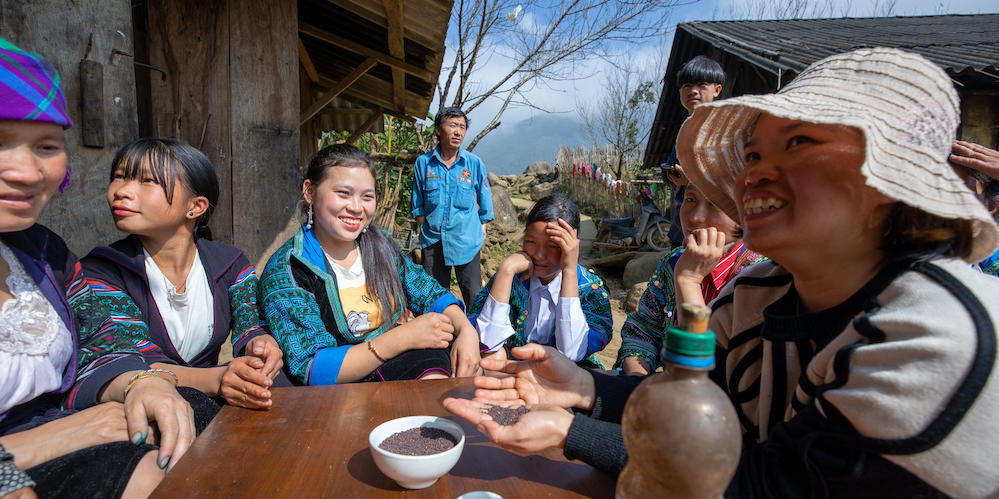Press and News Bringing better seeds to indigenous farmers in Vietnam’s Northern highlands

How can increased access to, and use of, high-quality seed translate into enhanced nutrition and income security for ethnic minority communities? A new research project in Vietnam’s Northern highlands aims to answer that question.
“When buying vegetable seeds from local seed shops, I cannot tell the difference between good quality seeds and poor ones,” says Giang Thi Mua, a 30-year old farmer living in Vietnam’s Lao Cai province. “Sometimes they germinate well, sometimes they don’t.”
Like other farmers in her village, Mua grows vegetables at her home garden for the family to eat, and she sells the excess at local markets for extra income. Indigenous vegetable varieties, like H’mong mustard, and common crops from other countries, like French bean, are familiar to her. However, she only knows a little about the nutrient-rich characteristics of these varieties and has not fully realized their potential to generate more income.
A consortium of international and national organizations led by the Alliance of Bioversity International and CIAT is supporting ethnic minority farmers like Mua in mountainous Northern Vietnam to access better quality seed by testing management practices on farms together with farmers and through novel value-chain arrangements. This may include testing new varieties or seed storage techniques, and linking farmers with new markets.
Improving nutrition and income through quality seeds
The seeds that local ethnic farmers like Mua use often lack desirable uniformity, health and physiological traits such as disease or drought resistance and micro-nutrient density. Phuong Nguyen, a Ph.D. student from Wageningen University & Research, one of the partners in the consortium, explains, “It is not only local farmers’ knowledge and skills that are relevant to preserve better seeds, but also other factors like severe weather conditions and a limited budget for seed storage facilities that pose many difficulties.”
The project “Integrated vegetable seed systems development in ethnic minority communities in Northern Vietnam for enhanced nutrition and income security” is being led by the Alliance, in collaboration with Wageningen University & Research, the Fruit and Vegetable Research Institute (FAVRI), Tan Loc Phat Seeds Company Ltd and several local organizations, and implemented with funding from the Dutch Research Council, under the Netherlands – CGIAR research programme from April 2019 to June 2022.
The aim is to understand how cultivating high-quality seed can translate into enhanced nutrition and income security among ethnic minority communities.
“As a research organization, we are contributing to this goal by bringing our technical expertise in vegetable seed production and value chain to the fields”, says Dr. Hanh Ngo, Head of Department of Vegetables and Spicy Crops of FAVRI. “We hope that ethnic minority farmers will adopt good practices in selecting, growing and saving seeds, especially those available within their communities, and be able to sell quality seeds and vegetables.”
Working with farmers to learn new techniques and skills
Partners are working together with two ethnic minorities in Lao Cai province – H’mong and Dao vegetable farmers – to research improved methods for the production and preservation of seeds of vegetables which fill important local dietary gaps, including H’mong mustard, pumpkin, French bean, flowering kohlrabi and flowering cabbage. Dao vegetable farmers are also being equipped with knowledge and skills needed to produce and market quality seeds for those vegetables, to improve their income.
Similar efforts are planned among Thai ethnic communities in Son La province, focusing on nutrition and encouraging commercial vegetable production for income generation.

Hmong farmers learn to differentiate high quality seeds. Credit: Alliance of Bioversity International and CIAT/Trong Chinh.
Improved access to quality seeds, either through new high quality varieties or farmer-saved seeds will play a key role in this work. Alliance researcher Huong Pham, says the focus on enhancing seed production capacities for farmers makes this project different.
“I have worked in commercial vegetable projects before, but never in a project on seed systems. This is interesting as we are helping ethnic minority farmers gain greater autonomy in seed production, but also challenging farmers as seed production is not easy at all. It requires a high level of precision and investment of time and effort from local farmers,” says Huong.
While improving access to high quality seeds, project researchers will also investigate the impact of improved seed access on nutrition security, household food and seed sourcing. Almost 600 ethnic minority households from 36 villages will participate in a nutrition and production training and will be provided with vegetable seeds. After these activities, the impact of training and seed provision on household vegetable diversity, seed and food access, and dietary diversity will be evaluated.
By piloting enhanced seed access through upgraded production and value chains, and conducting research on the linkage between seed assess and nutrition security, the Alliance and partners hope to gain a better understanding of trade-offs in the seed systems in Vietnam’s Northern highlands. This is essential in the design of highly adapted research for the benefit of local communities and will inform the policy debate steering Southeast Asian seed governance.
This article was first printed in VN Economy. For more information about the project, please contact: Kees Swaans ([email protected]) or Pham Thi Mai Huong ([email protected]).
